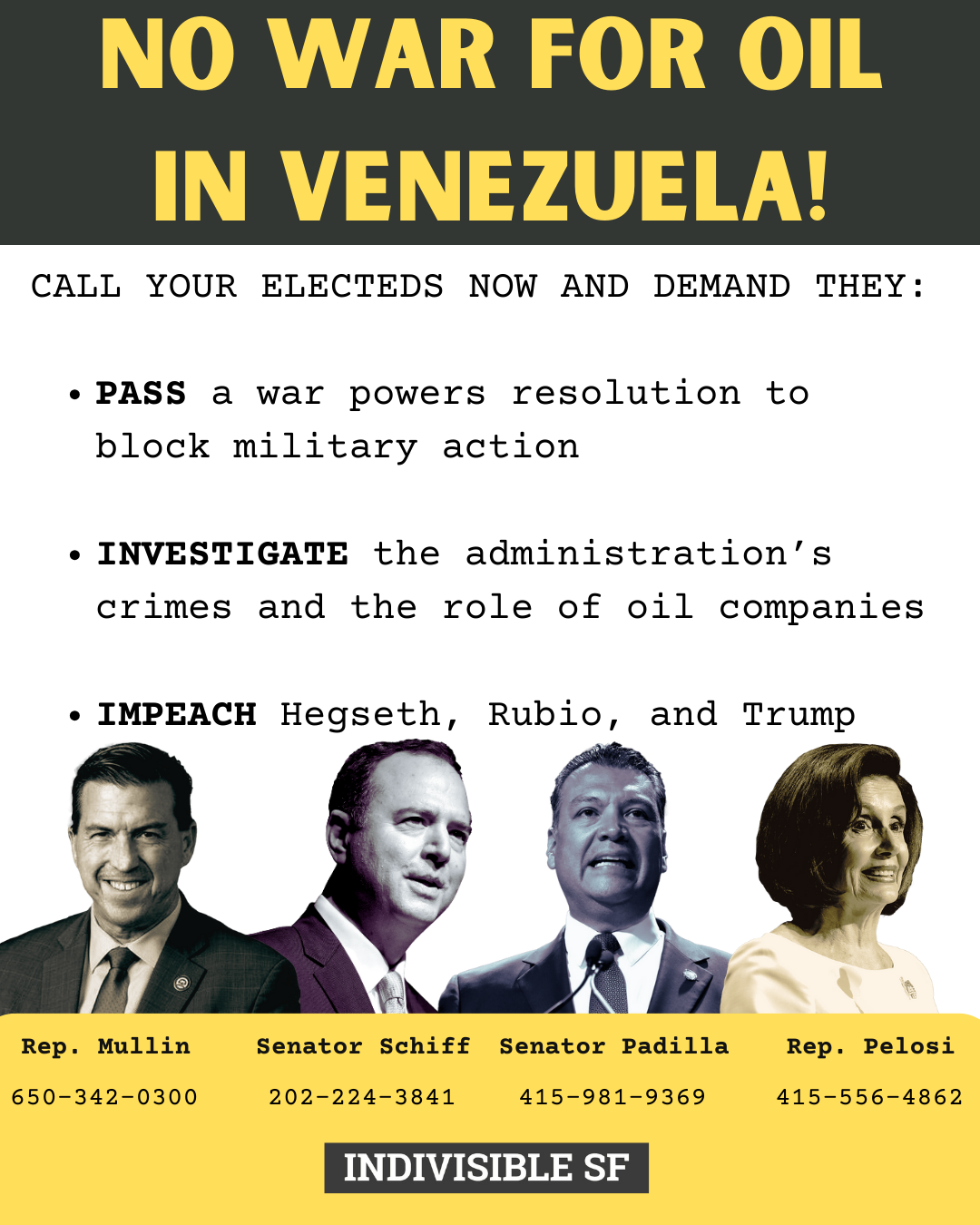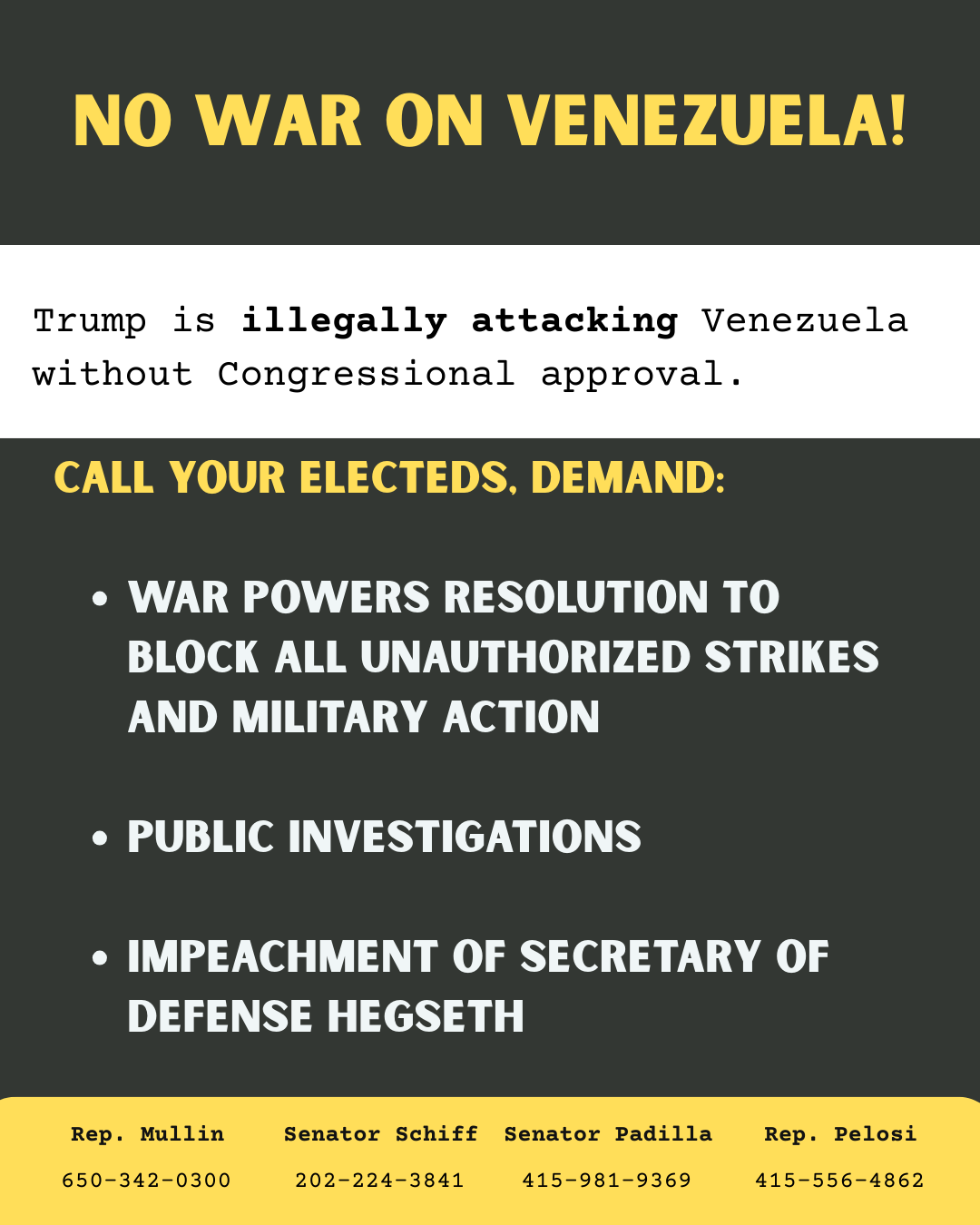Tell your Senators - Block FERC appointments until public hearings on the Climate Crisis are held!
Senator Dianne Feinstein
SF Office: (415) 393-0707
DC Office: (202) 224-3841
LA Office: (310) 914-7300
Fresno Office: (559) 485-7430
San Diego Office: (619) 231-9712
If you can't get through to one office, try another. There is no benefit to calling one office over another. Leaving a voicemail is as good as reaching a live person. Hate the phone? Resistbot is your friend.
Senator Kamala Harris
SF Office: (415) 981-9369
DC Office: (202) 224-3553
Sacramento Office: (916) 448-2787
LA Office: (213) 894-5000
San Diego Office: (619) 239-3884
Call the SF office first, but try the other offices if you can’t get through. If you can’t get a live person, leave a voicemail and also send a follow-up email written in your own words. Hate the phone? Resistbot is your friend.
Call Script
My name is __________. I am a constituent, and my zip code is _______. I am a member of Indivisible SF.
The super-storms battering the South and the fires raging throughout the West with smoke choking our cities are directly caused by global warming. There is a clear and direct link between these disastrous effects of climate change and Trump regime actions that increase environmental damage - such as sabotage of the Paris Climate Agreement, eliminating or weakening every major policy designed to combat dangerous emissions, and federal encouragement and expansion of fossil fuel extraction and fracking.
This is not time for business as usual on Capitol Hill. The Federal Energy Regulatory Commission (FERC) consistently rubber-stamps permits for new fossil fuel pipelines and infrastructure. This has to stop. ‘
I ask the Senator to do everything in her power to block confirmation of Trump's two new FERC appointments until there have been public hearings and effective actions taken to address FERC’s outrageous abuses of the climate, the environment, people’s rights, and local community interests all over the country.
Background
Super-storms are battering the South while fires are raging throughout the West with smoke choking our cities. These natural disasters are the inevitable and long-predicted result of global warming caused by greenhouse gas emissions produced by burning fossil fuels. Fires, floods, and storms will grow steadily worse until we reverse course and adopt policies to reduce rather than increase global warming.
But the Trump regime, its Republican Party enablers, and the Republican-majority on the Federal Energy Regulatory Commission (FERC) are all hell-bent on boosting the fortunes of their coal, oil, and gas industry donors by repealing or gutting every policy designed to combat dangerous emissions while encouraging and expanding fossil fuel consumption and fracking. We the People have got to take action to save the environment and the future of our children.
We must demand that our Members of Congress hold hearings on the Trump regime’s actions that damage the environment and put people’s lives in danger.
Here are just a few examples of the Trump Administration’s environmental deregulation that will accelerate the climate crisis.
Lowering Vehicle Efficiency Standards
Transportation accounts for the largest chunk (29%) of American greenhouse gas emissions, and the U.S. has among the weakest vehicle fuel efficiency standards in the world. U.S. Corporate Average Fuel Efficiency (CAFE) standards were first implemented in 1975 in the wake of the Arab oil embargo to reduce American reliance on foreign oil.
The Energy Independence and Security Act of 2007 requires the Department of Transportation (DoT) to set CAFE standards at a "maximum feasible level" for new cars and trucks. Finalized in October 2012, the new CAFE standards steadily increased the average fuel efficiency requirements for new passenger vehicles to 54.5 miles per gallon by 2025. On 4/13/2018, the EPA withdrew the Obama administration's final determination and issued a notice to resume the midterm evaluation. (On 5/1/2018, a coalition of 18 state attorneys general led by California sued the EPA, claiming the proposal was a violation of the Clean Air Act.)
On 8/28/18, the Environment Protection Agency (EPA) and National Highway Traffic Safety Administration (NHTSA) released a notice of proposed rulemaking (NPRM), for a new Safer Affordable Fuel-Efficient (SAFE) Vehicles rule, rolling back fuel efficiency standards for passenger cars and light trucks. The rule, finalized 3/30/20, increases the stringency of corporate average fuel efficiency (CAFE) and CO2 emissions standards by 1.5% per year over model years (MY) 2021-2026, which is better than their initial proposal to freeze the increase of CAFE standards. But Obama-era standards would’ve increased the stringency of the efficiency standards by 5% per year, which would’ve allowed vehicle manufacturers to average 54 miles per gallon by 2026, the new SAFE standards allow an average of 40 miles per gallon by 2026.
Repealing the Clean Power Plan
The goal of the Clean Power Plan (CPP), finalized under the Obama administration in 10/23/2015, was to reduce greenhouse gas emissions from the electricity sector, which is responsible for approximately 30% of America's overall greenhouse gas emissions.
On 7/8/2019, EPA finalized three separate and distinct rulemakings, including the repeal of the CPP.
Replacement of CPP with ACE (Affordable Clean Energy) Rule: The EPA's Regulatory Impact Analysis predicts that ACE would increase carbon dioxide emissions by over 60 million short tons by 2030 in the minimum case scenario, relative to CPP predictions. The final rules were expected to go into effect on September 6, 2019. (On August 13, 2019, the state of New York, along with 21 other states and seven cities, filed a lawsuit seeking a review of this action. The states claimed that ACE does not meaningfully reduce greenhouse gas emissions and therefore violates the EPA’s duties under the Clean Air Act to address carbon pollution from power plants.)
Rolling back Methane Emissions Standards
Weakening regulations on emissions from new oil & gas wells
Weakening requirements for testing and repairing oil and gas leaks in drilling operations
Weakening aspects of New Source Performance Standards (NSPS)
EPA’s Deceptive “Transparency Rule”
The proposed rule would only allow the EPA to consider studies where the underlying data is made available publicly. Such restrictions could affect how the agency protects Americans from toxic chemicals, air pollution and other health risks. Scientists and public health groups warn that the rule would effectively block the EPA from relying on long-standing, landmark studies on the harmful effects of air pollution and pesticide exposure because such research often involves confidential personal or medical histories or proprietary information.
Sources:
What is the Trump administration’s track record on the environment? Brookings overview.
Six Things You Should Know About The EPA’s New Science Restriction Draft Policy. Union of Concerned Scientists
Database of Trump Era Deregulation. Brookings







